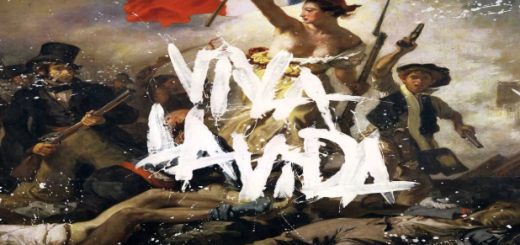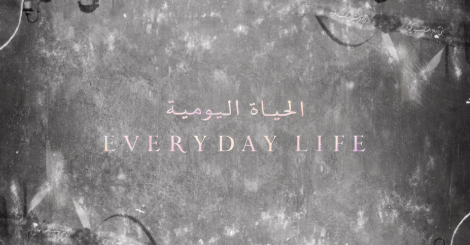Coldplay’s “Trouble in Town” Lyrics Meaning
“Trouble in Town” is theorized to encapsulate Coldplay’s empathy for non-White people due to the persecution they face in certain parts of the world. This is made most evident during the interlude. This interlude features an actual recording of innocent African-American pedestrians being harassed by a White police officer. But as with other songs on the band’s “Everyday Life” album, the message of this one is intended to be more macrocosmic in nature.
So for instance, the line stating “my sister can’t wear her crown” is said to reference issues Muslim women who prefer (or are forced) to wear hijabs have to deal with. And the specific “trouble in town” which is mentioned in the title is the fact that the aforementioned types of individuals can’t find adequate “shelter” or “peace” in said areas. What they get in return is instead “more police”. The “more police” basically alludes to official law enforcement who basically devoid them of the aforementioned, as well as other basic rights.

So all in what is the central theme of this song? It can be said to be primarily focused on a specific type of issue minorities face in countries run by White people.
Does “Trouble in Town” reference Michael Brown’s Murder?
Michael Brown was an African-American teenager who was shot dead by a police officer in Ferguson, Missouri. This incident occurred on the date of 9 August 2014. It contributed to lots of protests in the States. Furthermore, it brought global attention to police brutality against minorities in America.
And yes, it is very much possible that when Chris Martin references his “brother brown” being “hung”, he is memorializing Brown. And in such case, the word “hung” would likely be an allusion to the act of lynching. Lynching was an earlier form of institutionalized murder in America. Many innocent Blacks were subjected to lynching during the Jim Crow era of American history.
Quick Facts about “Trouble in Town”
Chris Martin composed this track along with his Coldplay bandmates. We therefore have the following names as the official writers of “Trouble in Town”:
- C. Martin
- W. Champion
- J. Buckland
- G. Berryman
And the track was produced by a number of the band’s regular collaborators. One such collaborator is Rik Simpsons.
Parlophone Records was the label responsible for the release of “Trouble in Town”. They released it along with the rest of Coldplay’s “Everyday Life” album. And it’s release date fell on the 22nd of November 2019.
The biggest highlight of this song is its interlude. And what’s so special about the interlude? It features a conversation recorded by an innocent African-American pedestrian in Philadelphia. In the tape, the innocent civilian is harassed by a white police officer named Philip Nace.
Was “Trouble in Town” released as a single?
No. But here are the official singles Coldplay released from “Everyday Life”:
- “Orphans”
- “Arabesque”
- “Everyday Life”
- “Daddy”
- “Champion of the World“
Does this Coldplay track use any samples?
Yes. It makes use of the popular African song “Jikelele”.
Meaning of the Music Video of “Trouble in Town”
This music video, which Aoife McCardle directed, is loosely based on a classic piece of English literature called “Animal Farm” (1945). In addition to making a direct reference to the book near the beginning of the video (“All Animals Are Equal”, “But Some Animals Are More Equal Than Others”), the people in the clip actually appear as anthropomorphic animals. In other words, they have human bodies but animal heads. For instance, Coldplay’s lead singer, Chris Martin, appears as a fox. And this is another allusion to the book, as in the novel the animals on the farm have human-like intelligence. Another way it is similar to the “Animal Farm” is that it depicts pigs as being in charge (i.e. politicians) of the animal kingdom, so to speak. Moreover like the actual “Trouble in Town” song, one of the major subthemes of the video is police brutality.
Maybe to some extent, like another piece of classic literature based on human-like animals entitled “Maus” (1991), the different types of creatures depicted in the video are meant to represent different races. For instance, we can definitely presume that the pigs symbolize White politicians. And arguably the foxes are representations of African-Americans. But even if such is the case, the visual doesn’t stick to this motif hardcore. Rather more than anything it just seems to depict prominent politicians as being an unfavorable lot and law enforcement as being biased against minorities and the defenseless.
Meanwhile it concludes by acknowledging that proceeds generated from the clip and the song itself are to be donated to two NGOs. One is the Innocence Project, an organization that fights on the behalf of wrongfully convicted prisoners. And the other is the African Children’s Feeding Scheme, which basically provides aid to poor South African children.









Hi,
As a muslim woman, I would just like to add that we are not “forced” into the hijab.
Other than that, I enjoyed the interpretation, thanks.
I beg to differ, Shamz. It is common knowledge that many Muslim women around the world (especially in Islamic countries) are forced to wear hijabs by men and society in general.
“Common knowledge” by outsiders listening to the non-practicing Muslims; but ignoring the devoted Muslims who felt empowered by the hijaab.
You cannot stereotype the whole community because of a few incidents my friend.
Majority of them wear it by choice!
Dear Oer, this is not entirely true that the ‘majority’ wear it by choice. In fact, we can not say whether it is a majority or a minority. There is simply a percentage that wears it by choice and a percentage that wears it by force. All in all, the truth is that the governments force a whole into the belief of a percentage, so in my opinion, it is quite unfair.
I am a muslim girl who neither chose Islam nor hijab and sometimes rage builds up inside me as a result of the knowledge that only taking a piece of garment off my hair will destroy my whole family (mostly father’s, unfortunately) reputation and lead to even more trouble regarding my education and career.
In colclusion, I hate the religion and country I’m forced into.
Wow, that was deep for someone like me who has no idea & not much of an opinion on the topic.
I was merely reading through the comments & noticing individuals behaving like……well I suppose I did read George Orwell’s book.
Sad story Eve, I wish you to find your happiness regarding this issue.
Thank you. Very well said.
I don’t know where YOU live but where i live women are in fact “forced” into hijab
Basically, what Islam told us is men and women MUST to cover some part of the body for example women hair need to be cover in hijab, men need to cover from belly towards whole knee, etc. In Islam its a MUST. In depends on individual, whether they want to follow or not. If they not following it, they will get sin.
Before I read this interpretation I thought “my sister can’t wear her crown” referred to women with curly hair being discriminated for wearing it natural and not able to wear her natural hair in work settings because it is “unprofessional” We often call our curly hair crowns.
“Blood on the beach, oh my godness blood on the beach.” In 2015, a 3-year-old Syrian refugee boy hit the shore in Turkey while fleeing to Greece. Every time I listen to this part of the song I think he means it, do you think it’s true?
I think it refers to the massacre on the beach in Tunisia. From wikipedia: “On 26 June 2015, a mass shooting occurred at the tourist resort at Port El Kantaoui, about 10 kilometres north of the city of Sousse, Tunisia. Thirty-eight people, 30 of whom were British, were killed when a gunman, Seifeddine Rezgui, attacked a hotel.”
It was big news in Britain obvs cuz most victims were British tourists.